高中英语句子成分讲解课件(共42张PPT)
文档属性
| 名称 | 高中英语句子成分讲解课件(共42张PPT) | 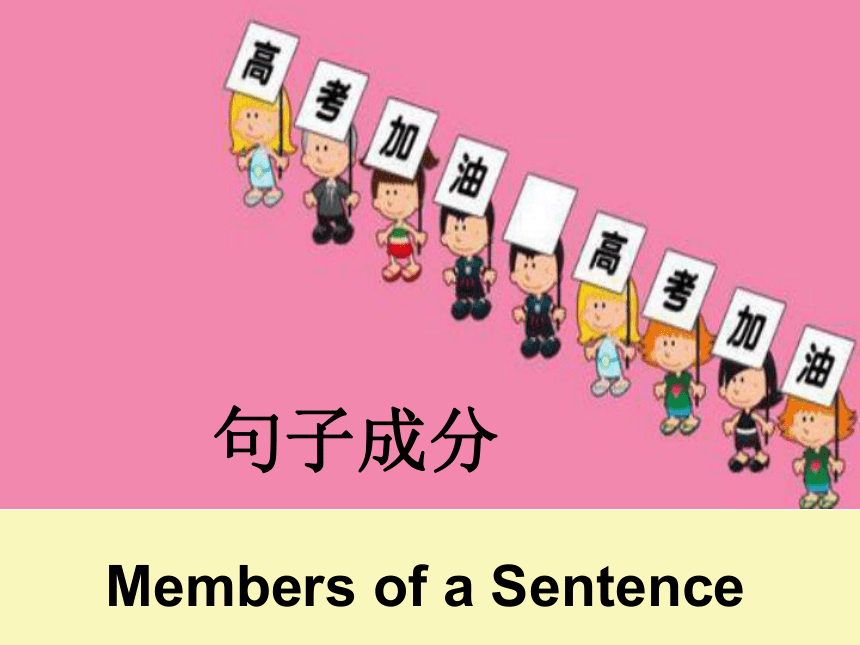 | |
| 格式 | zip | ||
| 文件大小 | 1.0MB | ||
| 资源类型 | 教案 | ||
| 版本资源 | 人教版(新课程标准) | ||
| 科目 | 英语 | ||
| 更新时间 | 2020-07-27 15:26:13 | ||
图片预览

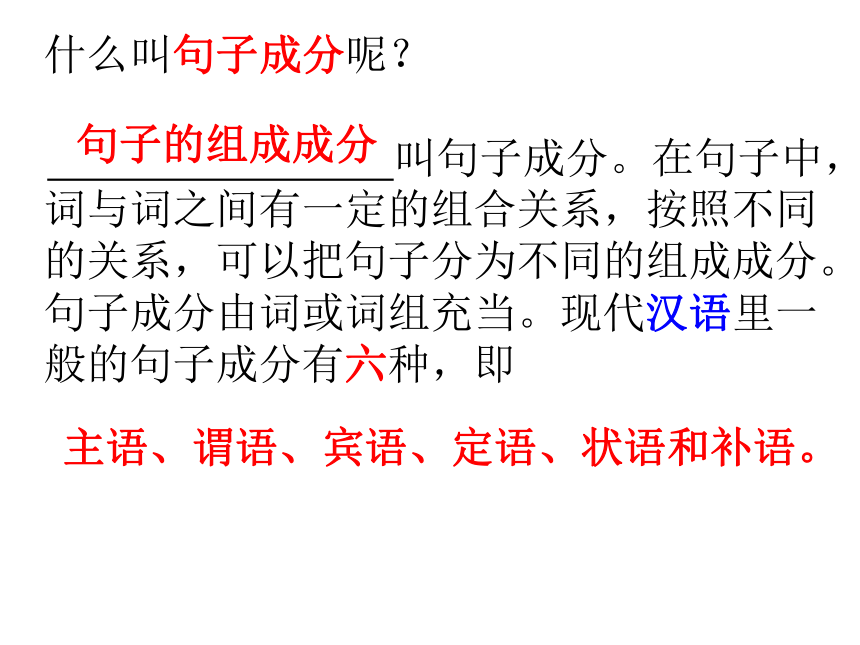
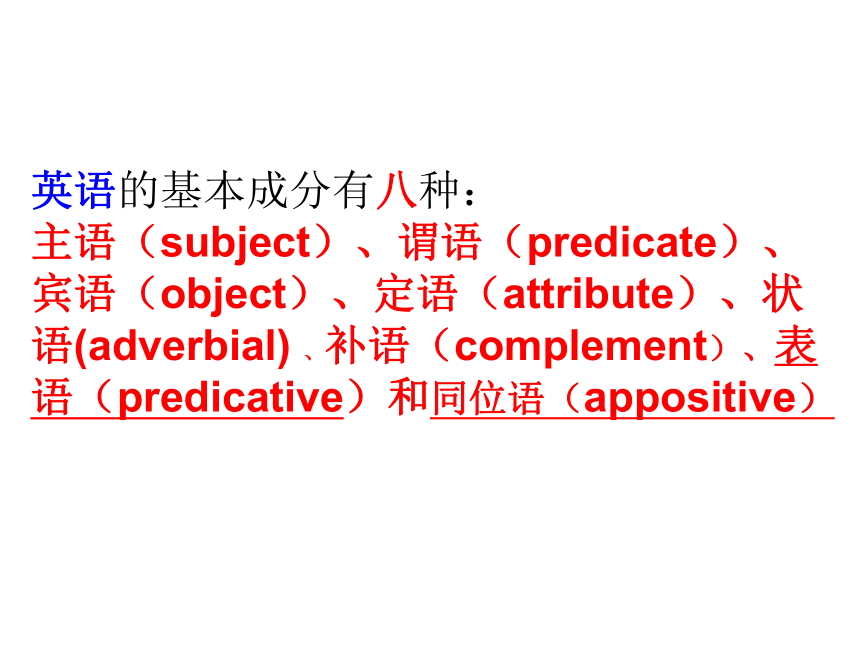
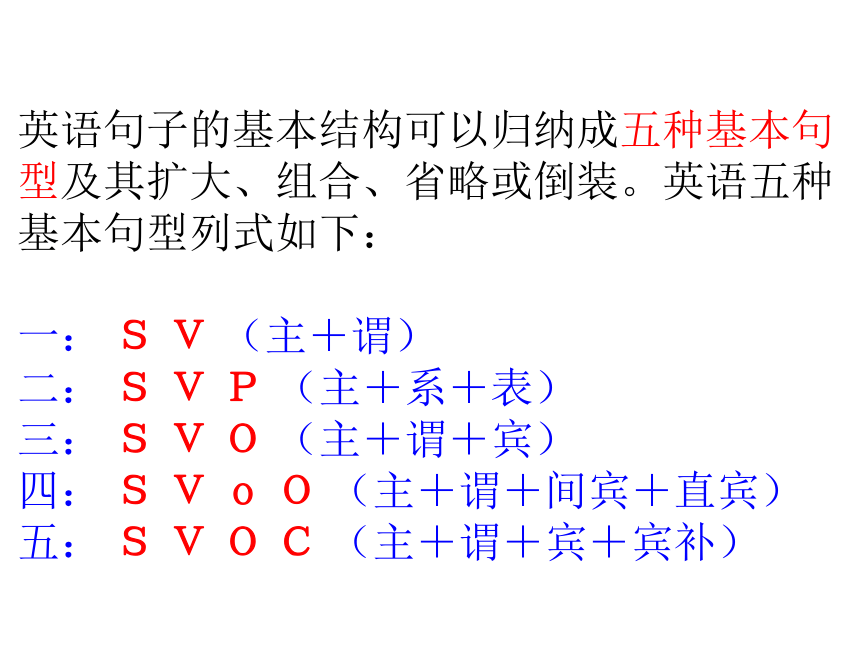
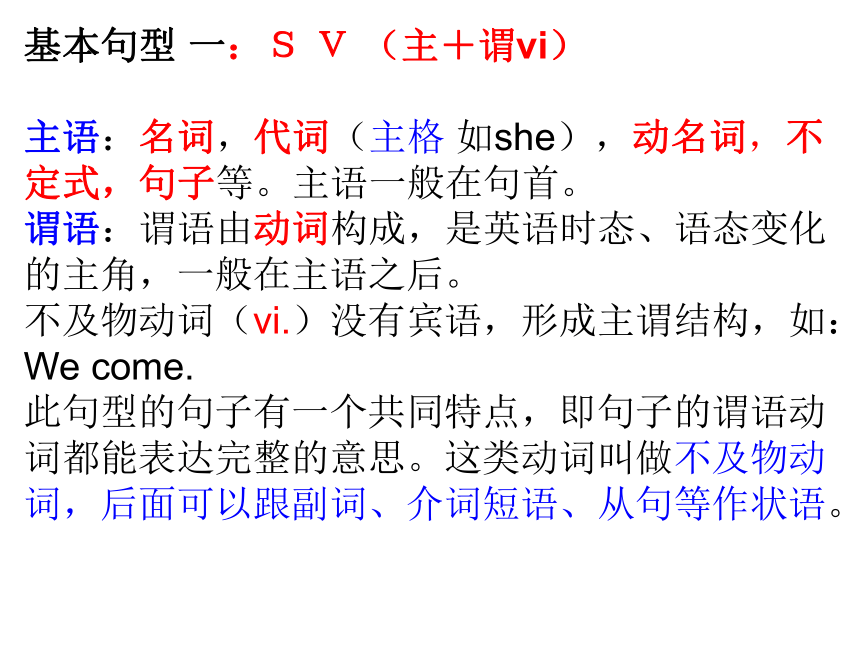


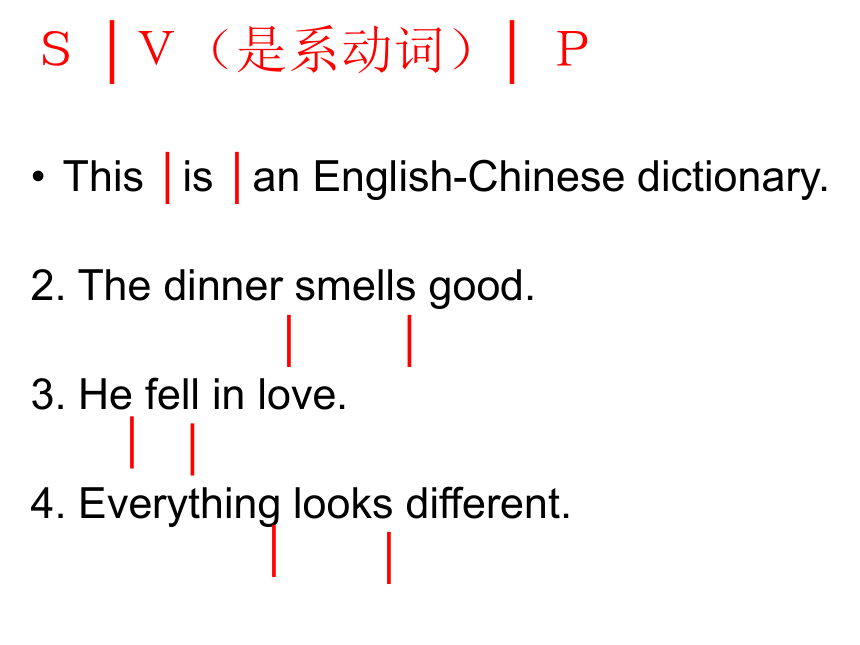
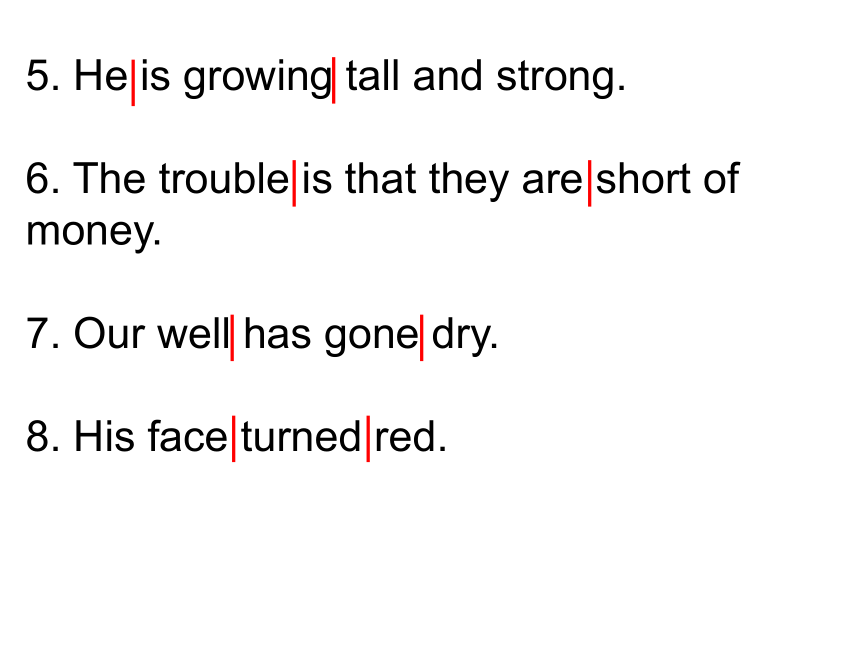
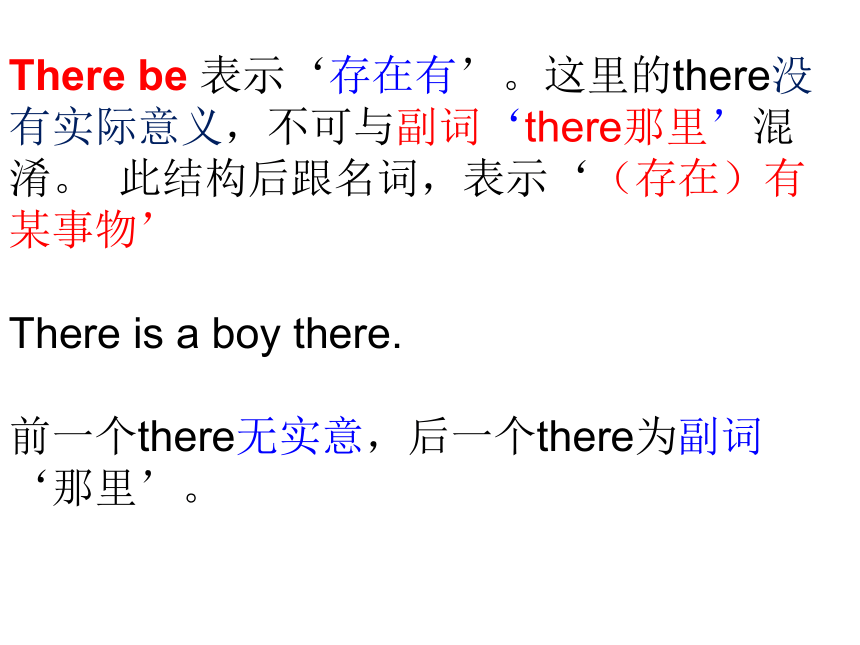
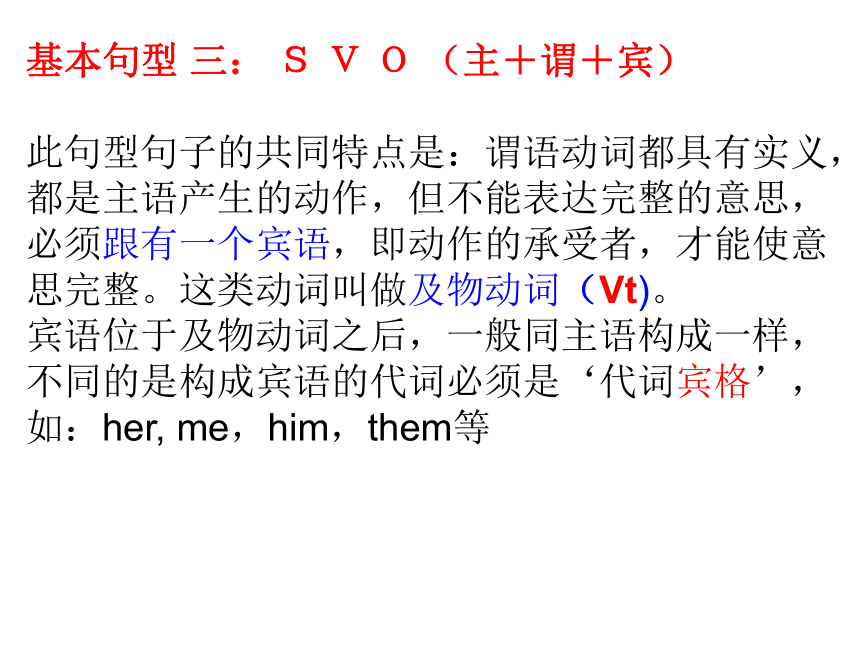

文档简介
(共42张PPT)
句子成分
Members
of
a
Sentence
什么叫句子成分呢?
叫句子成分。在句子中,词与词之间有一定的组合关系,按照不同的关系,可以把句子分为不同的组成成分。句子成分由词或词组充当。现代汉语里一般的句子成分有六种,即
句子的组成成分
主语、谓语、宾语、定语、状语和补语。
英语的基本成分有八种:
主语(subject)、谓语(predicate)、宾语(object)、定语(attribute)、状语(adverbial)
、补语(complement)、表语(predicative)和同位语(appositive)
英语句子的基本结构可以归纳成五种基本句型及其扩大、组合、省略或倒装。英语五种基本句型列式如下:
一:
S
V
(主+谓)
二:
S
V
P
(主+系+表)
三:
S
V
O
(主+谓+宾)
四:
S
V
o
O
(主+谓+间宾+直宾)
五:
S
V
O
C
(主+谓+宾+宾补)
基本句型
一:S
V
(主+谓vi)
主语:名词,代词(主格
如she),动名词,不定式,句子等。主语一般在句首。
谓语:谓语由动词构成,是英语时态、语态变化的主角,一般在主语之后。
不及物动词(vi.)没有宾语,形成主谓结构,如:We
come.
此句型的句子有一个共同特点,即句子的谓语动词都能表达完整的意思。这类动词叫做不及物动词,后面可以跟副词、介词短语、从句等作状语。
The
sun
│was
shining.
2.
Doing
homework│counts.
3.
The
universe
remains.
4.
We
all
breathe,
eat,
and
drink.
5.
Who
cares?
6.
What
he
said
does
not
matter.
7.
They
talked
for
half
an
hour.
8.
The
pen
writes
smoothly
│
│
│
│
│
│
基本句型
二:
S
V
P
(主+系+表)
此句型的句子有一个共同的特点:句子谓语动词都不能表达一个完整的意思,必须加上一个表明主语身份或状态的表语构成复合谓语,才能表达完整的意思。这类动词叫做连系动词
(link.v)。
系动词分两类:be,
stay,
keep,
seem等属一类,表示情况;get,
grow,
become,
turn等属另一类,表示变化。感官动词多可用作连系动词:look,
sound
,feel,
smell,
taste
另常见的连系动词有:remain,
prove
,,
appear,
stand,
fall,
lie
,come
等
S
│V(是系动词)│
P
This
│is
│an
English-Chinese
dictionary.
2.
The
dinner
smells
good.
3.
He
fell
in
love.
4.
Everything
looks
different.
│
│
│
│
│
│
5.
He
is
growing
tall
and
strong.
6.
The
trouble
is
that
they
are
short
of
money.
7.
Our
well
has
gone
dry.
8.
His
face
turned
red.
│
│
│
│
│
│
│
│
There
be
表示‘存在有’。这里的there没有实际意义,不可与副词‘there那里’混淆。
此结构后跟名词,表示‘(存在)有某事物’
There
is
a
boy
there.
前一个there无实意,后一个there为副词‘那里’。
基本句型
三:
S
V
O
(主+谓+宾)
此句型句子的共同特点是:谓语动词都具有实义,都是主语产生的动作,但不能表达完整的意思,必须跟有一个宾语,即动作的承受者,才能使意思完整。这类动词叫做及物动词(Vt)。
宾语位于及物动词之后,一般同主语构成一样,不同的是构成宾语的代词必须是‘代词宾格’,如:her,
me,him,them等
Who
│knows
│the
answer?
2.
She
smiled
her
thanks.
3.
He
has
refused
to
help
them.
4.
He
enjoys
reading.
5.
They
ate
what
was
left
over.
6.
He
said
"Good
morning."
│
│
│
│
│
│
│
│
│
│
S
│V(及物动词)│
O
句型
四:
S
V
o
O
(主+谓+间宾+直宾)
有些及物动词可以有两个宾语,如:give/pass/bring/show/offer/send/order等。这两个宾语通常一个指人,为间接宾语;一个指物,为直接宾语。间接宾语一般位于直接宾语之前。
一般的顺序为:动词
+
间接宾语
+
直接宾语。
如:Give
me
a
cup
of
tea,
please.
强调间接宾语则顺序为:
动词
+
直接宾语
+介词+
间接宾语。
如:Show
this
house
to
Mr.
Smith.
若直接宾语为人称代词:
动词+
代词直接宾语
+介词+
间接宾语。
如:Bring
it
to
me,
please.
S
│V(及物)│
o(多指人)
│
O(多指物)
She
ordered
herself
a
new
dress.
2.
She
cooked
her
husband
a
delicious
meal.
3.
He
brought
you
a
dictionary.
4.
He
denies
her
nothing.
5.
I
showed
him
my
pictures.
6.
I
gave
my
car
a
wash.
7.
I
told
him
that
the
bus
was
late.
8.
He
showed
me
how
to
run
the
machine.
│
│
│
│
│
│
│
│
│
│
│
│
│
│
│
│
│
│
│
│
│
│
│
│
句型
五:
S
V
O
C
(主+谓+宾+宾补)
此句型的句子的共同特点是:动词虽然是及物动词,但是只跟一个宾语还不能表达完整的意思,必须加上一个补充成分来补足宾语,才能使意思完整。
宾语补足语:位于宾语之后对宾语作出说明的成分。补充说明宾语的动作,身份,性质或状态。宾语与其补足语有逻辑上的主谓关系,它们一起构成复合宾语。
名词/代词宾格
+
名词
The
war
made
him
a
soldier.
名词/代词宾格
+
形容词
New
methods
make
the
job
easy.
名词/代词宾格
+
副词
Lucy
left
the
light
on
all
night
名词/代词宾格
+
介词短语
I
often
find
him
at
work.
名词/代词宾格
+
动词不定式
The
teacher
ask
the
students
to
close
the
windows.
.
_______
_____
_______
_____________
_____________________
名词/代词宾格
+
过去分词
He
spoke
loudly
to
make
himself
heard
by
the
listeners.
名词/代词宾格
+
现在分词
I
saw
a
cat
running
across
the
road
S
│V(及物)│
O(宾语)
│
C(宾补)
1.
They
│appointed
│him
│manager.
2.
They
│painted
│the
door
│green.
3.
This
set
them
thinking.
4.
They
found
the
house
deserted.
5.
What
makes
him
think
so?
6.
We
saw
him
out.
7.
He
asked
me
to
come
back
soon.
8.
I
saw
them
getting
on
the
bus.
│
│
│
│
│
│
│
│
│
│
│
│
│
│
│
│
│
│
句子成分练习题(
一
)
(一).
指出下列句中主语的中心词
①
The
teacher
with
two
of
his
students
is
walking
into
the
classroom.
②
There
is
an
old
man
coming
here.
③
The
useful
dictionary
was
given
by
my
mother
last
year.
④
To
do
today's
homework
without
the
teacher's
help
is
very
difficult.
_________
____________
______________________
_________________________
(二)
选出句中谓语的中心词
①
I
don't
like
the
picture
on
the
wall.
②
The
days
get
longer
and
longer
when
summer
comes.
③
Do
you
usually
go
to
school
by
bus?
④
There
will
be
a
meeting
at
the
library
this
afternoon.
⑤
Did
the
twins
have
porridge
for
their
breakfast?
⑥
Tom
didn't
do
his
homework
yesterday.
⑦
What
I
want
to
tell
you
is
this.
⑧
We
had
better
send
for
a
doctor.
⑨
He
is
interested
in
music.
⑩
Whom
did
you
give
my
book
to?
___
___
____
__
____
___
__
____
___
___
(三)
挑出下列句中的宾语
①
My
brother
hasn't
done
his
homework.
②
People
all
over
the
world
speak
English.
③
They
didn't
know
who
"Father
Christmas"
really
is.
④You
will
find
it
useful
after
you
leave
school.
⑤
Some
of
the
students
in
the
school
want
to
go
swimming.
⑥
The
old
man
sitting
at
the
gate
said
he
was
ill.
⑦
They
made
him
monitor
of
the
class.
⑧
Go
across
the
bridge
and
you
will
find
the
museum
on
the
left.
_____________
_______
____________________________
__
_______
_________
_______
______
_______
_____
________
(四)
挑出下列句中的表语
①
The
old
man
was
feeling
very
tired.
②
Why
is
he
worried
about
Jim?
③
The
leaves
have
turned
yellow.
④
Soon
They
all
became
interested
in
the
subject.
⑤
She
was
the
first
to
learn
about
it.
___________
_____________________
_______
__________________
_______
________
(五)
挑出下列句中的宾语补足语
①
She
likes
the
children
to
read
newspapers
and
books
in
the
reading-room.
②
He
asked
her
to
take
the
boy
out
of
school.
③
She
found
it
difficult
to
do
the
work.
④
They
call
me
Lily
sometimes.
⑤
I
saw
Mr
Wang
get
on
the
bus.
⑥
Did
you
see
Li
Ming
playing
football
on
the
playground
just
now?
_____________________
_________________________
__________________________
_____________
_____
_____________
_____________________________
(六)
划出句中的直接宾语和间接宾语
①
Please
tell
us
a
story.
②
My
father
bought
a
new
bike
for
me
last
week.
③
Mr
Li
is
going
to
teach
us
history
next
term.
④
Here
is
a
pen.Give
it
to
Tom.
⑤
Did
he
leave
any
message
for
me?
__
_____
__________
___
___
_____
___
_____
____________
__
指出下列句子中划线部分的句子成分:
1.Whether
we’ll
go
depend
on
the
weather
.
2.
People’s
standards
of
living
are
going
up
steadily
.
3.
That
was
how
they
were
defeated.
4.The
nursery
takes
good
care
of
our
children
.
5.I’ll
return
the
book
to
you
tomorrow
.
6.We
are
sure
that
we
shall
succeed
.
7.I
saw
a
man
come
in
the
building
8.Please
pass
me
a
book.
9.Have
you
been
to
the
Great
Wall?
10.They
are
discussing
how
to
deal
with
the
problem.
主从
谓
表从
宾
间宾
宾从
宾补
直宾
宾
谓
但常用的英语句子并不都象基本句型这样简短,这些句子除了基本句型的成分不变外,通常是在这些成分的前面或后面增加一些修饰语(modifier)而加以扩大。这些修饰语可以是单词(主要是形容词、副词和数词),也可以是各种类型的短语(主要是介词短语、不定式短语和分词短语)。我们称之为:定语、状语
一、
定语:定语是对名词或代词起修饰、限定作用的词、短语或句子,译为‘……的’。定语通常位于被修饰的成分前。若修饰some,any,every,no构成的复合不定代词时,(如:something、nothing);或不定式、分词短语作定语、从句作定语时,则定语通常置后。副词用作定语时须放在名词之后。
形容词作定语:
The
little
boy
needs
a
blue
pen.
little修饰名词boy;blue修饰名词pen.
Tom
is
a
handsome
boy.。
There
is
a
good
boy。
数词作定语相当于形容词:
Two
boys
need
two
pens.。
The
two
boys
are
students.
There
are
two
boys
in
the
room.
代词或名词所有格作定语:
The
boy
needs
Tom's
pen
His
name
is
Tom.
There
are
two
boys
of
Lucy’s
there。
介词短语作定语:
The
boy
in
the
classroom
needs
a
pen
of
yours.
The
boy
in
blue
is
Tom。
There
are
two
boys
of
9,and
three
of
10
名词作定语:
The
boy
needs
a
ball
pen.
There
is
only
one
ball
pen
in
the
pencil
box.
副词作定语:
The
boy
there
needs
a
pen.
The
best
boy
here
is
Tom.
不定式作定语
The
boy
to
write
this
letter
needs
a
pen.
The
boy
to
write
this
letter
is
Tom.
There
is
nothing
to
do
today.
分词(短语)作定语:
The
smiling
boy
needs
a
pen
bought
by
his
mother
The
pen
bought
by
her
is
made
in
China
There
are
five
boys
left.
定语从句:
The
boy
who
is
reading
needs
the
pen
which
you
bought
yesterday.
The
boy
you
will
know
is
Tom.。
There
are
five
boys
who
will
play
the
game.
二、状语:状语修饰动词、形容词、副词或全句,说明方式、因果、条件、时间、地点、让步、方向、程度、目的等。
状语在句子中的位置很灵活,常见情况为:通常在句子基本结构之后,强调时放在句首;修饰形容词或副词时,通常位于被修饰的词之前;表示时间、地点、目的的状语一般位于句子两头,强调时放在句首,地点状语一般须在时间状语之前;一些表示不确定时间(如:often)或程度(如:almost)的副词状语通常位于be动词、助动词、情态动词之后,动词之前。
有时状语在句中的某个位置会引起歧义,应注意,如:The
boy
calls
the
girl
in
the
classroom.一般理解成‘男孩喊教室里的女孩‘(此时in
the
classroom为girl的定语),也可以理解为‘男孩在教室里喊女孩’(此时in
the
classroom为地点状语),最好写作‘In
the
classroom,
the
boy
calls
the
girl
副词(短语)作状语:
The
boy
needs
a
pen
very
much.程度状语)
The
boy
needs
very
much
the
pen
bought
by
his
mother。(宾语较长则状语前置)
The
boy
really
needs
a
pen.(程度状语)
The
boy
needs
a
pen
now./Now,the
boy
needs
a
pen./The
boy,now,needs
a
pen.
(时间状语)
介词短语作状语:
In
the
classroom,the
boy
needs
a
pen.地点状语)
Before
his
mother,Tom
is
always
a
boy.
(条件状语)
On
Sundays,there
is
no
student
in
the
classroom.(时间状语)
分词(短语)作状语:
He
sits
there,asking
for
a
pen.
表示伴随状态)
Having
to
finish
his
homework,the
boy
needs
a
pen.(原因状语)
Frightened,he
sits
there
soundlessly原因状语)
不定式作状语:
The
boy
needs
a
pen
to
do
his
homework.
目的状语
To
make
his
dream
come
true,Tom
becomes
very
interested
in
business.
名词作状语:
Come
this
way!(方向状语)
状语从句:
时间状语从句、地点状语从句、原因状语从句、结果状语从句、目的状语从句
、比较状语从句、让步状语从句、条件状语从句
三、同位语:同位语是在名词或代词之后并列名词或代词对前者加以说明的成分,近乎于后置定语。如:
We
students
should
study
hard.
/
(students是we的同位语,都是指同一批‘学生’)
We
all
are
students.
/
(all是we的同位语,都指同样的‘我们’)
四、独立成分:有时句子中会有一些与句子没有语法联系的成分,称为句子独立成分(注意:区别于分词独立结构)。
感叹词:oh,hello,aha,ah,等。
肯定词yes
否定词no
称呼语:称呼人的用语。
插入语:一些句中插入的
I
think
,
I
believe,等。
如:
The
story,I
think,has
never
come
to
the
end./我相信,这个故事还远没结束.
情态词,表示说话人的语气(多作为修饰全句的状语):perhaps也许,maybe大概,acturely实际上,certainly当然,等。
五、分词独立结构:分词作状语时其逻辑主语与句子的主语一致!
否则应有自己的逻辑主语,构成分词独立结构。
错句:Studying
hard,
your
score
will
go
up.
正确:
Studying
hard,
you
can
make
your
score
go
up.
或
If
you
study
hard,
your
score
will
go
up.
解析:错句中分词studying没有自带逻辑主语,则其逻辑主语就是句子的主语,既your
score
.
显然做study的应是人,不应是your
score(分数).
正确句(1)更正了句子的主语,使其与分词逻辑主语一致(
同为you
);正确句(2)则使用条件分句带出study的主语。
Game
(being)
over,
he
went
home.
He
stands
there,
book
(being)
in
hand.
独立结构还可用with、without引导,作状语或定语。这种结构不但可以用分词,还可以用不定式、形容词、介词短语、副词或名词等。
With
nothing
to
do,
he
fell
asleep
soon.
The
teacher
came
in,
with
glasses
on
his
nose.
(五)
挑出下列句中的定语
①
They
use
Mr,
Mrs
with
the
family
name.
②
What
is
your
given
name?
③
On
the
third
lap
are
Class
1
and
Class
3.
④
I
am
afraid
some
people
forgot
to
sweep
the
floor.
⑤
The
man
downstairs
was
trying
to
sleep.
⑥
I
am
waiting
for
the
sound
of
the
other
shoe!
__________________
_________
_____
_____
_______
_______________
(七)
挑出下列句中的状语
①
There
was
a
big
smile
on
her
face.
②
Every
night
he
heard
the
noise
upstairs.
③
He
began
to
learn
English
when
he
was
eleven.
④
The
man
on
the
motorbike
was
travelling
too
fast.
⑤
With
the
medicine
box
under
her
arm,
Miss
Li
hurried
off.
⑥
She
loves
the
library
because
she
loves
books.
⑦
I
am
afraid
that
if
you've
lost
it,
you
must
pay
for
it.
⑧
The
students
followed
Uncle
Wang
to
see
the
other
machine.
_________
_________
___________________
____
____
____________________________________
________________________
_______________
_____________
______
指出下列句子中划线部分的句子成分:
1.Whether
we’ll
go
depend
on
the
weather
.
2.
People’s
standards
of
living
are
going
up
steadily
.
3.
That
was
how
they
were
defeated.
4.The
nursery
takes
good
care
of
our
children
.
5.I’ll
return
the
book
to
you
tomorrow
.
6.We
are
sure
that
we
shall
succeed
.
7.The
woman
with
a
baby
in
her
arms
is
his
other
.
8.There
are
many
film
that
I’d
like
to
see.
9.Have
you
met
the
person
about
whom
he
was
speaking
?
10.I
have
a
lot
of
work
to
do
.
主
谓
表
宾
间宾
宾从
定
定
定
定
11.
Anyway
I
won’t
stop
you
from
doing
it
.
12.
I
said
it
in
fun
.
13.
We
can
send
a
car
over
to
fetch
you
.
14.
She
had
to
work
standing
up
.
15.
Seeing
this
,some
comrades
became
very
worried
.
16.
Much
interested
,
he
agreed
to
give
it
a
try
.
17.
The
bus
arrived
ten
minutes
late
.
18.
We
should
serve
the
people
heart
and
soul.
19.
Spring
coming
on
,
the
tree
turned
green
.
20.
Some
farmers
saw
something
strange
in
the
sky
.
状
状
状
状
状
状
状
状
状
定
句子成分
Members
of
a
Sentence
什么叫句子成分呢?
叫句子成分。在句子中,词与词之间有一定的组合关系,按照不同的关系,可以把句子分为不同的组成成分。句子成分由词或词组充当。现代汉语里一般的句子成分有六种,即
句子的组成成分
主语、谓语、宾语、定语、状语和补语。
英语的基本成分有八种:
主语(subject)、谓语(predicate)、宾语(object)、定语(attribute)、状语(adverbial)
、补语(complement)、表语(predicative)和同位语(appositive)
英语句子的基本结构可以归纳成五种基本句型及其扩大、组合、省略或倒装。英语五种基本句型列式如下:
一:
S
V
(主+谓)
二:
S
V
P
(主+系+表)
三:
S
V
O
(主+谓+宾)
四:
S
V
o
O
(主+谓+间宾+直宾)
五:
S
V
O
C
(主+谓+宾+宾补)
基本句型
一:S
V
(主+谓vi)
主语:名词,代词(主格
如she),动名词,不定式,句子等。主语一般在句首。
谓语:谓语由动词构成,是英语时态、语态变化的主角,一般在主语之后。
不及物动词(vi.)没有宾语,形成主谓结构,如:We
come.
此句型的句子有一个共同特点,即句子的谓语动词都能表达完整的意思。这类动词叫做不及物动词,后面可以跟副词、介词短语、从句等作状语。
The
sun
│was
shining.
2.
Doing
homework│counts.
3.
The
universe
remains.
4.
We
all
breathe,
eat,
and
drink.
5.
Who
cares?
6.
What
he
said
does
not
matter.
7.
They
talked
for
half
an
hour.
8.
The
pen
writes
smoothly
│
│
│
│
│
│
基本句型
二:
S
V
P
(主+系+表)
此句型的句子有一个共同的特点:句子谓语动词都不能表达一个完整的意思,必须加上一个表明主语身份或状态的表语构成复合谓语,才能表达完整的意思。这类动词叫做连系动词
(link.v)。
系动词分两类:be,
stay,
keep,
seem等属一类,表示情况;get,
grow,
become,
turn等属另一类,表示变化。感官动词多可用作连系动词:look,
sound
,feel,
smell,
taste
另常见的连系动词有:remain,
prove
,,
appear,
stand,
fall,
lie
,come
等
S
│V(是系动词)│
P
This
│is
│an
English-Chinese
dictionary.
2.
The
dinner
smells
good.
3.
He
fell
in
love.
4.
Everything
looks
different.
│
│
│
│
│
│
5.
He
is
growing
tall
and
strong.
6.
The
trouble
is
that
they
are
short
of
money.
7.
Our
well
has
gone
dry.
8.
His
face
turned
red.
│
│
│
│
│
│
│
│
There
be
表示‘存在有’。这里的there没有实际意义,不可与副词‘there那里’混淆。
此结构后跟名词,表示‘(存在)有某事物’
There
is
a
boy
there.
前一个there无实意,后一个there为副词‘那里’。
基本句型
三:
S
V
O
(主+谓+宾)
此句型句子的共同特点是:谓语动词都具有实义,都是主语产生的动作,但不能表达完整的意思,必须跟有一个宾语,即动作的承受者,才能使意思完整。这类动词叫做及物动词(Vt)。
宾语位于及物动词之后,一般同主语构成一样,不同的是构成宾语的代词必须是‘代词宾格’,如:her,
me,him,them等
Who
│knows
│the
answer?
2.
She
smiled
her
thanks.
3.
He
has
refused
to
help
them.
4.
He
enjoys
reading.
5.
They
ate
what
was
left
over.
6.
He
said
"Good
morning."
│
│
│
│
│
│
│
│
│
│
S
│V(及物动词)│
O
句型
四:
S
V
o
O
(主+谓+间宾+直宾)
有些及物动词可以有两个宾语,如:give/pass/bring/show/offer/send/order等。这两个宾语通常一个指人,为间接宾语;一个指物,为直接宾语。间接宾语一般位于直接宾语之前。
一般的顺序为:动词
+
间接宾语
+
直接宾语。
如:Give
me
a
cup
of
tea,
please.
强调间接宾语则顺序为:
动词
+
直接宾语
+介词+
间接宾语。
如:Show
this
house
to
Mr.
Smith.
若直接宾语为人称代词:
动词+
代词直接宾语
+介词+
间接宾语。
如:Bring
it
to
me,
please.
S
│V(及物)│
o(多指人)
│
O(多指物)
She
ordered
herself
a
new
dress.
2.
She
cooked
her
husband
a
delicious
meal.
3.
He
brought
you
a
dictionary.
4.
He
denies
her
nothing.
5.
I
showed
him
my
pictures.
6.
I
gave
my
car
a
wash.
7.
I
told
him
that
the
bus
was
late.
8.
He
showed
me
how
to
run
the
machine.
│
│
│
│
│
│
│
│
│
│
│
│
│
│
│
│
│
│
│
│
│
│
│
│
句型
五:
S
V
O
C
(主+谓+宾+宾补)
此句型的句子的共同特点是:动词虽然是及物动词,但是只跟一个宾语还不能表达完整的意思,必须加上一个补充成分来补足宾语,才能使意思完整。
宾语补足语:位于宾语之后对宾语作出说明的成分。补充说明宾语的动作,身份,性质或状态。宾语与其补足语有逻辑上的主谓关系,它们一起构成复合宾语。
名词/代词宾格
+
名词
The
war
made
him
a
soldier.
名词/代词宾格
+
形容词
New
methods
make
the
job
easy.
名词/代词宾格
+
副词
Lucy
left
the
light
on
all
night
名词/代词宾格
+
介词短语
I
often
find
him
at
work.
名词/代词宾格
+
动词不定式
The
teacher
ask
the
students
to
close
the
windows.
.
_______
_____
_______
_____________
_____________________
名词/代词宾格
+
过去分词
He
spoke
loudly
to
make
himself
heard
by
the
listeners.
名词/代词宾格
+
现在分词
I
saw
a
cat
running
across
the
road
S
│V(及物)│
O(宾语)
│
C(宾补)
1.
They
│appointed
│him
│manager.
2.
They
│painted
│the
door
│green.
3.
This
set
them
thinking.
4.
They
found
the
house
deserted.
5.
What
makes
him
think
so?
6.
We
saw
him
out.
7.
He
asked
me
to
come
back
soon.
8.
I
saw
them
getting
on
the
bus.
│
│
│
│
│
│
│
│
│
│
│
│
│
│
│
│
│
│
句子成分练习题(
一
)
(一).
指出下列句中主语的中心词
①
The
teacher
with
two
of
his
students
is
walking
into
the
classroom.
②
There
is
an
old
man
coming
here.
③
The
useful
dictionary
was
given
by
my
mother
last
year.
④
To
do
today's
homework
without
the
teacher's
help
is
very
difficult.
_________
____________
______________________
_________________________
(二)
选出句中谓语的中心词
①
I
don't
like
the
picture
on
the
wall.
②
The
days
get
longer
and
longer
when
summer
comes.
③
Do
you
usually
go
to
school
by
bus?
④
There
will
be
a
meeting
at
the
library
this
afternoon.
⑤
Did
the
twins
have
porridge
for
their
breakfast?
⑥
Tom
didn't
do
his
homework
yesterday.
⑦
What
I
want
to
tell
you
is
this.
⑧
We
had
better
send
for
a
doctor.
⑨
He
is
interested
in
music.
⑩
Whom
did
you
give
my
book
to?
___
___
____
__
____
___
__
____
___
___
(三)
挑出下列句中的宾语
①
My
brother
hasn't
done
his
homework.
②
People
all
over
the
world
speak
English.
③
They
didn't
know
who
"Father
Christmas"
really
is.
④You
will
find
it
useful
after
you
leave
school.
⑤
Some
of
the
students
in
the
school
want
to
go
swimming.
⑥
The
old
man
sitting
at
the
gate
said
he
was
ill.
⑦
They
made
him
monitor
of
the
class.
⑧
Go
across
the
bridge
and
you
will
find
the
museum
on
the
left.
_____________
_______
____________________________
__
_______
_________
_______
______
_______
_____
________
(四)
挑出下列句中的表语
①
The
old
man
was
feeling
very
tired.
②
Why
is
he
worried
about
Jim?
③
The
leaves
have
turned
yellow.
④
Soon
They
all
became
interested
in
the
subject.
⑤
She
was
the
first
to
learn
about
it.
___________
_____________________
_______
__________________
_______
________
(五)
挑出下列句中的宾语补足语
①
She
likes
the
children
to
read
newspapers
and
books
in
the
reading-room.
②
He
asked
her
to
take
the
boy
out
of
school.
③
She
found
it
difficult
to
do
the
work.
④
They
call
me
Lily
sometimes.
⑤
I
saw
Mr
Wang
get
on
the
bus.
⑥
Did
you
see
Li
Ming
playing
football
on
the
playground
just
now?
_____________________
_________________________
__________________________
_____________
_____
_____________
_____________________________
(六)
划出句中的直接宾语和间接宾语
①
Please
tell
us
a
story.
②
My
father
bought
a
new
bike
for
me
last
week.
③
Mr
Li
is
going
to
teach
us
history
next
term.
④
Here
is
a
pen.Give
it
to
Tom.
⑤
Did
he
leave
any
message
for
me?
__
_____
__________
___
___
_____
___
_____
____________
__
指出下列句子中划线部分的句子成分:
1.Whether
we’ll
go
depend
on
the
weather
.
2.
People’s
standards
of
living
are
going
up
steadily
.
3.
That
was
how
they
were
defeated.
4.The
nursery
takes
good
care
of
our
children
.
5.I’ll
return
the
book
to
you
tomorrow
.
6.We
are
sure
that
we
shall
succeed
.
7.I
saw
a
man
come
in
the
building
8.Please
pass
me
a
book.
9.Have
you
been
to
the
Great
Wall?
10.They
are
discussing
how
to
deal
with
the
problem.
主从
谓
表从
宾
间宾
宾从
宾补
直宾
宾
谓
但常用的英语句子并不都象基本句型这样简短,这些句子除了基本句型的成分不变外,通常是在这些成分的前面或后面增加一些修饰语(modifier)而加以扩大。这些修饰语可以是单词(主要是形容词、副词和数词),也可以是各种类型的短语(主要是介词短语、不定式短语和分词短语)。我们称之为:定语、状语
一、
定语:定语是对名词或代词起修饰、限定作用的词、短语或句子,译为‘……的’。定语通常位于被修饰的成分前。若修饰some,any,every,no构成的复合不定代词时,(如:something、nothing);或不定式、分词短语作定语、从句作定语时,则定语通常置后。副词用作定语时须放在名词之后。
形容词作定语:
The
little
boy
needs
a
blue
pen.
little修饰名词boy;blue修饰名词pen.
Tom
is
a
handsome
boy.。
There
is
a
good
boy。
数词作定语相当于形容词:
Two
boys
need
two
pens.。
The
two
boys
are
students.
There
are
two
boys
in
the
room.
代词或名词所有格作定语:
The
boy
needs
Tom's
pen
His
name
is
Tom.
There
are
two
boys
of
Lucy’s
there。
介词短语作定语:
The
boy
in
the
classroom
needs
a
pen
of
yours.
The
boy
in
blue
is
Tom。
There
are
two
boys
of
9,and
three
of
10
名词作定语:
The
boy
needs
a
ball
pen.
There
is
only
one
ball
pen
in
the
pencil
box.
副词作定语:
The
boy
there
needs
a
pen.
The
best
boy
here
is
Tom.
不定式作定语
The
boy
to
write
this
letter
needs
a
pen.
The
boy
to
write
this
letter
is
Tom.
There
is
nothing
to
do
today.
分词(短语)作定语:
The
smiling
boy
needs
a
pen
bought
by
his
mother
The
pen
bought
by
her
is
made
in
China
There
are
five
boys
left.
定语从句:
The
boy
who
is
reading
needs
the
pen
which
you
bought
yesterday.
The
boy
you
will
know
is
Tom.。
There
are
five
boys
who
will
play
the
game.
二、状语:状语修饰动词、形容词、副词或全句,说明方式、因果、条件、时间、地点、让步、方向、程度、目的等。
状语在句子中的位置很灵活,常见情况为:通常在句子基本结构之后,强调时放在句首;修饰形容词或副词时,通常位于被修饰的词之前;表示时间、地点、目的的状语一般位于句子两头,强调时放在句首,地点状语一般须在时间状语之前;一些表示不确定时间(如:often)或程度(如:almost)的副词状语通常位于be动词、助动词、情态动词之后,动词之前。
有时状语在句中的某个位置会引起歧义,应注意,如:The
boy
calls
the
girl
in
the
classroom.一般理解成‘男孩喊教室里的女孩‘(此时in
the
classroom为girl的定语),也可以理解为‘男孩在教室里喊女孩’(此时in
the
classroom为地点状语),最好写作‘In
the
classroom,
the
boy
calls
the
girl
副词(短语)作状语:
The
boy
needs
a
pen
very
much.程度状语)
The
boy
needs
very
much
the
pen
bought
by
his
mother。(宾语较长则状语前置)
The
boy
really
needs
a
pen.(程度状语)
The
boy
needs
a
pen
now./Now,the
boy
needs
a
pen./The
boy,now,needs
a
pen.
(时间状语)
介词短语作状语:
In
the
classroom,the
boy
needs
a
pen.地点状语)
Before
his
mother,Tom
is
always
a
boy.
(条件状语)
On
Sundays,there
is
no
student
in
the
classroom.(时间状语)
分词(短语)作状语:
He
sits
there,asking
for
a
pen.
表示伴随状态)
Having
to
finish
his
homework,the
boy
needs
a
pen.(原因状语)
Frightened,he
sits
there
soundlessly原因状语)
不定式作状语:
The
boy
needs
a
pen
to
do
his
homework.
目的状语
To
make
his
dream
come
true,Tom
becomes
very
interested
in
business.
名词作状语:
Come
this
way!(方向状语)
状语从句:
时间状语从句、地点状语从句、原因状语从句、结果状语从句、目的状语从句
、比较状语从句、让步状语从句、条件状语从句
三、同位语:同位语是在名词或代词之后并列名词或代词对前者加以说明的成分,近乎于后置定语。如:
We
students
should
study
hard.
/
(students是we的同位语,都是指同一批‘学生’)
We
all
are
students.
/
(all是we的同位语,都指同样的‘我们’)
四、独立成分:有时句子中会有一些与句子没有语法联系的成分,称为句子独立成分(注意:区别于分词独立结构)。
感叹词:oh,hello,aha,ah,等。
肯定词yes
否定词no
称呼语:称呼人的用语。
插入语:一些句中插入的
I
think
,
I
believe,等。
如:
The
story,I
think,has
never
come
to
the
end./我相信,这个故事还远没结束.
情态词,表示说话人的语气(多作为修饰全句的状语):perhaps也许,maybe大概,acturely实际上,certainly当然,等。
五、分词独立结构:分词作状语时其逻辑主语与句子的主语一致!
否则应有自己的逻辑主语,构成分词独立结构。
错句:Studying
hard,
your
score
will
go
up.
正确:
Studying
hard,
you
can
make
your
score
go
up.
或
If
you
study
hard,
your
score
will
go
up.
解析:错句中分词studying没有自带逻辑主语,则其逻辑主语就是句子的主语,既your
score
.
显然做study的应是人,不应是your
score(分数).
正确句(1)更正了句子的主语,使其与分词逻辑主语一致(
同为you
);正确句(2)则使用条件分句带出study的主语。
Game
(being)
over,
he
went
home.
He
stands
there,
book
(being)
in
hand.
独立结构还可用with、without引导,作状语或定语。这种结构不但可以用分词,还可以用不定式、形容词、介词短语、副词或名词等。
With
nothing
to
do,
he
fell
asleep
soon.
The
teacher
came
in,
with
glasses
on
his
nose.
(五)
挑出下列句中的定语
①
They
use
Mr,
Mrs
with
the
family
name.
②
What
is
your
given
name?
③
On
the
third
lap
are
Class
1
and
Class
3.
④
I
am
afraid
some
people
forgot
to
sweep
the
floor.
⑤
The
man
downstairs
was
trying
to
sleep.
⑥
I
am
waiting
for
the
sound
of
the
other
shoe!
__________________
_________
_____
_____
_______
_______________
(七)
挑出下列句中的状语
①
There
was
a
big
smile
on
her
face.
②
Every
night
he
heard
the
noise
upstairs.
③
He
began
to
learn
English
when
he
was
eleven.
④
The
man
on
the
motorbike
was
travelling
too
fast.
⑤
With
the
medicine
box
under
her
arm,
Miss
Li
hurried
off.
⑥
She
loves
the
library
because
she
loves
books.
⑦
I
am
afraid
that
if
you've
lost
it,
you
must
pay
for
it.
⑧
The
students
followed
Uncle
Wang
to
see
the
other
machine.
_________
_________
___________________
____
____
____________________________________
________________________
_______________
_____________
______
指出下列句子中划线部分的句子成分:
1.Whether
we’ll
go
depend
on
the
weather
.
2.
People’s
standards
of
living
are
going
up
steadily
.
3.
That
was
how
they
were
defeated.
4.The
nursery
takes
good
care
of
our
children
.
5.I’ll
return
the
book
to
you
tomorrow
.
6.We
are
sure
that
we
shall
succeed
.
7.The
woman
with
a
baby
in
her
arms
is
his
other
.
8.There
are
many
film
that
I’d
like
to
see.
9.Have
you
met
the
person
about
whom
he
was
speaking
?
10.I
have
a
lot
of
work
to
do
.
主
谓
表
宾
间宾
宾从
定
定
定
定
11.
Anyway
I
won’t
stop
you
from
doing
it
.
12.
I
said
it
in
fun
.
13.
We
can
send
a
car
over
to
fetch
you
.
14.
She
had
to
work
standing
up
.
15.
Seeing
this
,some
comrades
became
very
worried
.
16.
Much
interested
,
he
agreed
to
give
it
a
try
.
17.
The
bus
arrived
ten
minutes
late
.
18.
We
should
serve
the
people
heart
and
soul.
19.
Spring
coming
on
,
the
tree
turned
green
.
20.
Some
farmers
saw
something
strange
in
the
sky
.
状
状
状
状
状
状
状
状
状
定
